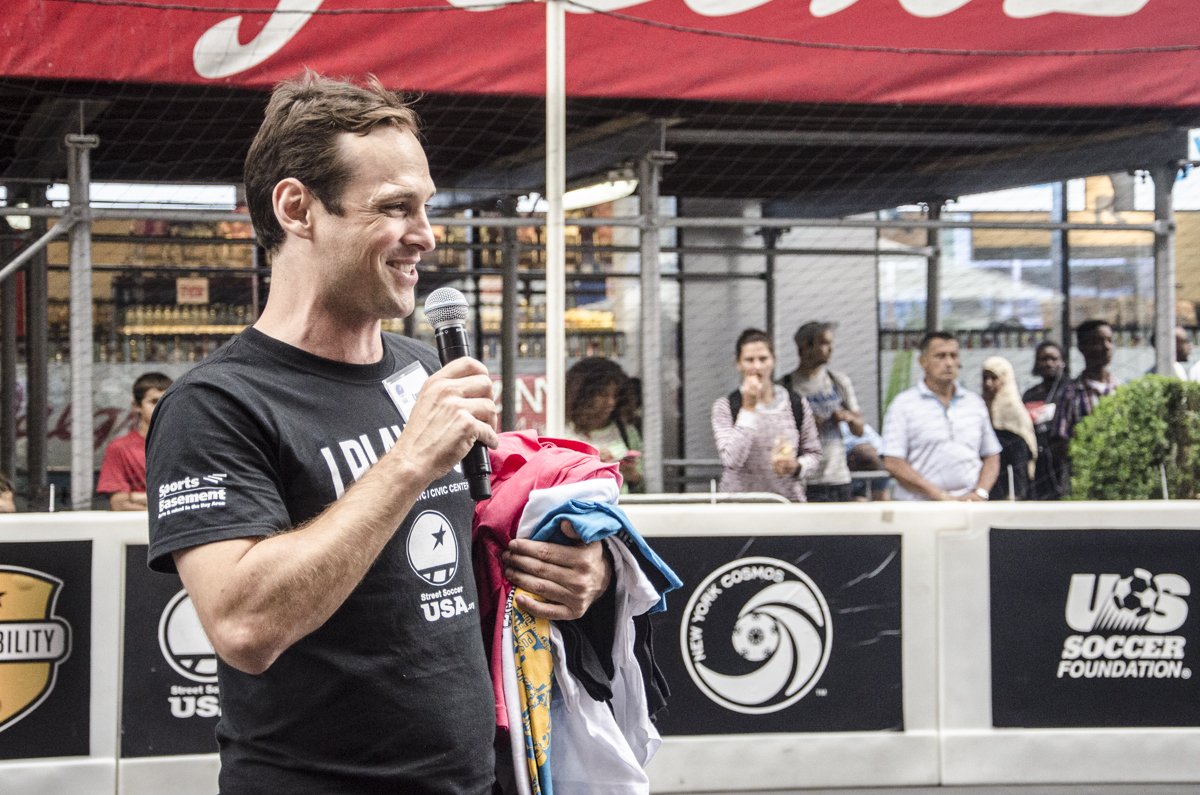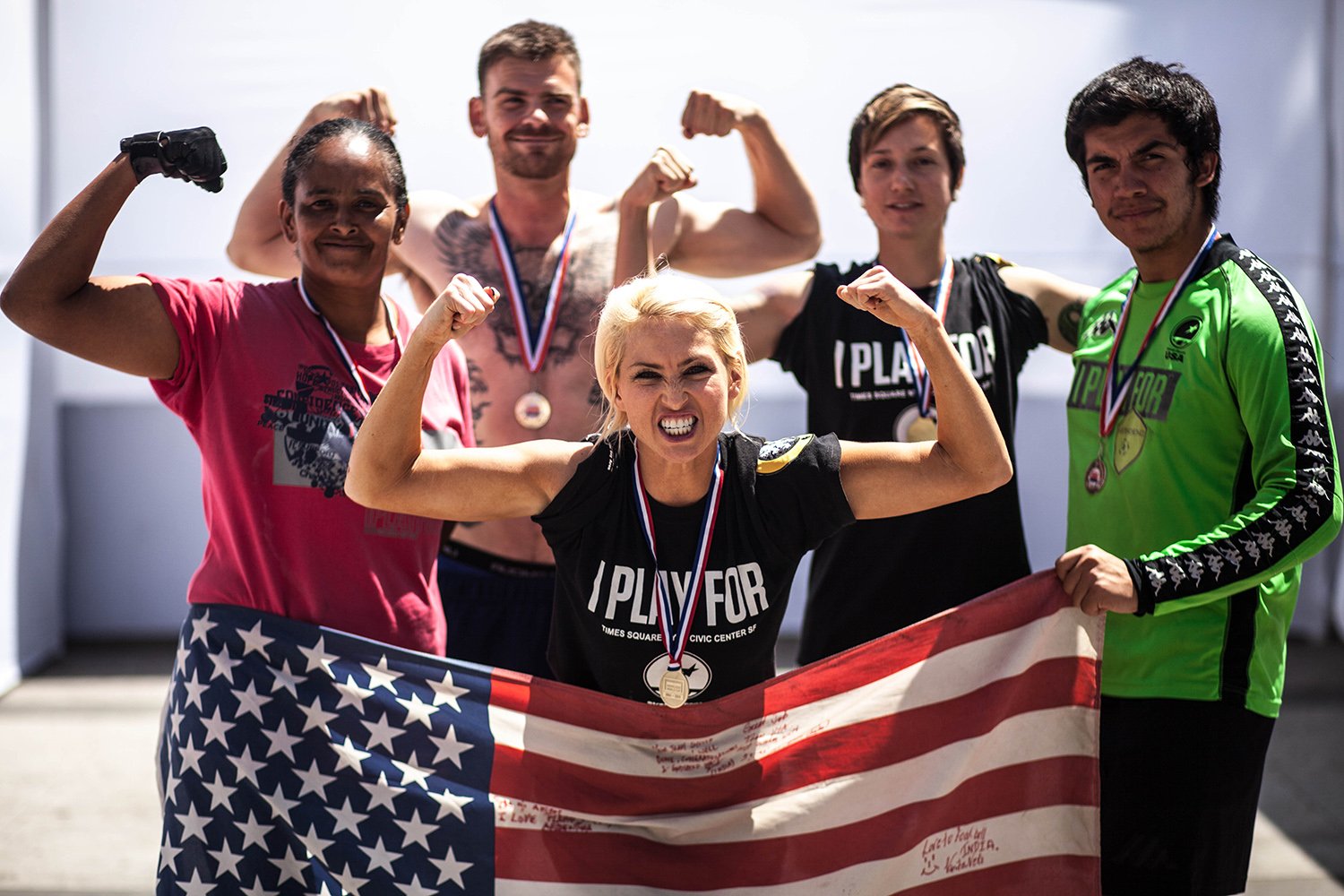Cann-Do Attitude Conquers Challenging Times
|Lawrence Cann, Founder and President of Street Soccer USA. Image: Street Soccer USA
In September 2022, Isobel Irvine caught up with Street Soccer USA founder and president Lawrence Cann. During the Times Square Cup street soccer event in New York, Lawrence explained where it all began.
“When I was a kid my family’s house burnt down. We were three brothers at the time, later five - it was just us and our mum in the house, my dad wasn’t living with us – and everything burned up, we would have been homeless but we had this incredible safety net.
“We had our grandparents, my soccer coach, our friends, we had insurance. The experience of that safety net of family and community stuck with me.”
Street Soccer USA founder and president, Lawrence Cann, knows he is one of the lucky ones. Aware of how close to the edge that nine-year-old in Richmond, Virginia came, his appreciation of having a community to help him and his family is deeply ingrained.
“I was volunteering at a shelter and it hit home to me very quickly that that would have been me had I not had that safety net.”
Buoyed by that support Lawrence, and brother Rob, went on to play Division 1 college soccer and was determined to give back to the wider community. After graduating college in North Carolina an initial month in 2002 helping at Urban Ministry Center – a homeless services centre in the state’s largest city, Charlotte – was the seed that grew into Street Soccer USA.
“I was volunteering at a shelter and it hit home to me very quickly that that would have been me had I not had that safety net,” he continues. “Maybe it was the way I was raised but I didn’t just want to make sandwiches for people or pass out soup. I wanted to get to know people as people, so I started organising activities.
“I started out with an art project – though I had a soccer background I was personally interested in art and tried to transition all my soccer energy into that. Much later athletics became the obvious way to relate to particularly the youngsters. Your relationships change when you play with people, you build that team support network, so we started playing soccer.”
Over the years Lawrence’s projects (a suite of programmes called Community Works 945) has helped hundreds of people overcome homelessness and established art, gardening and sporting social enterprises for homeless youth and adults, all of which continue to the present day.
The beautiful game, however, remained Lawrence’s long-time passion and the soccer projects bloomed, as he explains:
“We looked around to see who else was doing stuff like this so we Googled and found Homeless World Cup. We reached out to them and they said yeah, bring a team to the next tournament. It was amazing!
|Team USA at the Homeless World Cup in Santiago, Chile in 2014.
“I Still feel close to the guys from that original team”
“So, we raised money, applied for grants and went to Scotland, to the event in Edinburgh in 2005. I was the head coach – the only time I did that, I passed on to other people after that – and we lost every game, by a lot of goals. Actually, as Street Soccer USA we lost our first 31 games, including all 9 at our first Homeless World Cup. But Edinburgh was the most wonderful experience.
“I still feel close to the guys from that original team – I look at them like they made everything possible because of their commitment when people were making fun of us.
“In the American context it wasn’t intuitive or obvious why what we were doing would help people. Soccer was seen as weird and homelessness is seen as ‘other’. But the beautiful thing was the metaphor. Sports make people relatable – when you play alongside people you just understand them in a different personal way. I love it, they love it. So that was it.
“Soccer was meaningful to everyone and if you can do something meaningful, you keep on doing it until it becomes not meaningful – but we’ve been doing it since Edinburgh and that’s a long time!”
From starting small, to a Nationwide programme
|USA at the Homeless World Cup in Paris, 2011
Officially coming into being in 2009, Street Soccer USA has grown from that first programme in Charlotte to 18 cities across the United States.
Under Lawrence’s leadership, duly assisted by brother Rob, the organisation has established relationships with a wealth of companies, foundations, and both national and local social service providers. Street Soccer USA was featured in the Sundance documentary film 'Kicking It!' (narrated by Colin Farrell) and Lawrence himself has picked up a number of awards, including being named a People Magazine Hero Among Us.
These days, competing in the Homeless World Cup is just one of the many activities undertaken by the organisation.
“Growing as an organisation to work with youth and adults has given us more infrastructure and allowed us to do more for our Homeless World Cup programme,” adds Lawrence.
“We thought about where these folks are coming from – it's institutional, it’s society, it’s a handful of neighbourhoods that are under-resourced that can trigger and cause homelessness. Just the economic instability as a baseline means that’s where a lot of this population is coming from.
“So, we started in these neighbourhoods and built youth programmes which have grown tremendously. It’s been wonderful to have the coaches from our original programme get involved and lead these programmes, giving back to the communities.
“We’re continually grateful to Homeless World Cup for leading the way and providing the platform and the space that makes our work possible.”
More space than anyone could possibly have wished for, in a less than positive sense, was to come in March 2020 with the onslaught of the global pandemic. In common with their fellow organisations, it was a huge challenge for Street Soccer USA.
“We build genuine trust and our relationships are real”
“Organisations like ours exist on operational efficiency – we get really good at what we do, we annualise everything, we become really efficient and we operate really lean, and what happens is you make the most of the social capital you build in the neighbourhoods,” Lawrence explains.
“So, we’re able to do things for a fraction of the budget because we build genuine trust and our relationships are real, so we can throw events and people come into the community because we engender trust in the community.
“When you stop doing stuff because you physically can’t do it, what happens is you lose a lot of the momentum. The pain is now, everyone coming back and trying to train up coaches, and you have a two-year gap where you have no new players. You do it again but you’re not just losing two years you’re losing four years because of the two years it takes you to build to the next few years.”
One corner flag in the pitch of resurgence, however, had come in the shape of the Street Soccer USA Times Square Cup, the return of the organisation’s tournament after its enforced absence in 2020 and 2021, and the opportunity for our chat with Lawrence on the eve of the event.
A partnership with German Bundesliga club Borussia Dortmund saw participants in the Youth Cup competition decked in the European club’s distinctive black and yellow strips with team mascot, Emma Bee, and Borussia Dortmund player legends on hand throughout the 12-hour event. The matches involved girls’, boys’, men’s and women’s teams, and an amazing fixture featuring the US National Amputee Soccer Team.
“The Times Square Cup has been running for seven years. This event we’ve got 410 players kicking a ball around a pop-up pitch in the heart of Times Square, with thousands watching in person as they pass by and virtually online."
Street Soccer USA is back, that safety net is back and, beams Lawrence, “It’s great to be back – just great.”
Find out more about Street Soccer USA and their work in communities across the United States.
Words: Isobel Irvine
Images: Street Soccer USA



